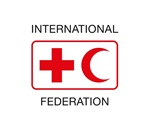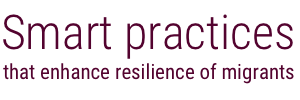The International Federation of Red Cross and Red Crescent Societies (IFRC), which coordinates humanitarian activities undertaken by the 190 National Red Cross and Red Crescent Societies worldwide, is engaging in a 45-month project, co-funded by the European Union (EU), to promote the rights of migrants in targeted countries, migration corridors and regions through a globally coordinated civil society action, with a specific focus on migrant domestic workers and victims of human trafficking. The project is being implemented by National Red Cross and Red Crescent Societies and 43 civil society organizations (CSOs) across 15 countries.
Rights of Migrants in Action supports the Movement’s mission to reduce risks, build community and individual resilience, and improve the lives of vulnerable migrants throughout their journey.
The developmental angle of this project brings out the unique nature of Movement work: committed to addressing needs and vulnerabilities of migrants, regardless of their legal status, throughout the migratory trail.
The project focuses on three components:
- Coordination
- CSO grants – migrants’ access to social services and protection
- Capacity building of CSOs
Coordination
- Dialogue with key partners and stakeholders such as components of the Movement, donors, governments, UN agencies, international organizations, civil society organizations and academia at international, regional and local levels.
- Research into migratory situations, policy and legislation, social services provision and key actors across the 15 countries. A global study on labour migration and human trafficking is envisaged.
- Exchange of practices among CSOs and enhancement of networks building/strengthening through regional dialogue.
CSO grants – migrants’ access to social services and protection
43 projects with CSOs, with approximately 116,000 direct and 400,000 indirect beneficiaries.
Target population:
- Migrant domestic workers – 15%
- Victims of human trafficking – 19%
- Migrant domestic workers – 66%
Areas of intervention of selected projects:
- Services
- Protection
- Awareness raising
- Advocacy
Capacity building of CSOs
- Tailor-made trainings on project management, communication and advocacy and migration.
Serikat Buruh Migran Indonesia/Indonesia Labour Migrant Union – Lembaga Pengembangan Masyarakat/Community Development Institutions (SBMI-LPM Equator) has been implementing the project in Indonesia since September 2015. The project is located in six districts of the five provinces (Central Sulawesi, North Sumatera, Riau Islands, West Kalimantan and West Nusa Tenggara).
In each location, the project has set up a call centre, a dedicated space providing support on a wide array of issues, including legal assistance, to both migrant workers and victims of violence. In collaboration with local government authorities at the district and village levels, call centres have assisted in the development of local regulation with regard to prevention of unsafe migration processes. Since this project commenced, efforts have resulted in the drafting of regulations on the local and district levels – this includes provisions on recruitment processes, roles and responsibilities of recruitment agencies and government institutions relating to the processing of migrant workers, and facilitation of immigration processes. In addition, the call centres on average have handled 3-10 cases on a variety of issues including unpaid wages, insurance claims, trafficking/smuggling, and the death penalty. From September 2015 to May 2016, 60 cases of migrant workers were overseen by the project, with 41 cases closed and 19 cases ongoing.
Through the call centre, SBMI-Equator has built partnerships with local governments and non-governmental organizations concerned with the rights of migrant workers.
The Integration Centre “Migration and Law”, a Rights of Migrants in Action partner CSO in Russia, provides support to the most vulnerable migrants with a special focus on domestic workers and victims of human trafficking. The Centre, which is staffed with three legal advisors, fluent in Kyrgyz, Tajik and Uzbek, provides assistance to migrants on issues pertaining to legal, medical and social matters through direct consultations and via a 24/7 hotline. The Centre also provides legal services on behalf of migrants whose rights have been violated. In 2015, the Centre provided consultation services to more than 2,500 migrants, including specific legal support to more than 140 individuals (e.g., negotiations with employers, court applications, etc.).
The safe house established by Fundación Esperanza in Ecuador provides a secure place for victims of human trafficking to realize their own strength and ability to work toward and maintain self-sufficiency. An array of services is provided at the safe house aimed at facilitating integration in the wider community, as well as the provision of psychosocial and emotional support. The safe house provides a series of workshops aimed at enabling participants to acquire the skillsets required to reintegrate into the labour market. The programmes are informed by a holistic approach that includes not only development of marketable skills but also ensures that appropriate psychosocial support is provided. An example of this includes ‘labour therapy,’ through which participants manually produce personal care products and household cleaners (e.g., shampoo, creams, perfumes, disinfectants, detergents, etc.). Manual and creative activity reinforces the psychological process and creates bonds for long-term therapeutic effect.
The project is being implemented by National Red Cross and Red Crescent Societies and 43 CSOs across 15 countries: Benin, Ecuador, Ethiopia, Guatemala, Honduras, Indonesia, Jordan, Lebanon, Kazakhstan, Morocco, Nepal, Russia, Tajikistan, Thailand and Zimbabwe.
The project addresses a wide range of vulnerabilities and needs encountered by migrants throughout their journey from countries of origin to transit and destination countries, and once settled. Activities include protection, healthcare, vocational training, legal and psychosocial assistance. Specific actions to raise awareness among migrants about their rights are also carried out, as well as advocacy initiatives targeting local and national authorities.
The project is in accordance with the IFRC Policy on Migration, particularly Principle 4: Recognizing the Rights of Migrants, and Principle 5: Linking Assistance, Protection and Humanitarian Advocacy for Migrants, and is guided by Operational Paragraphs 2 (access to services), 3 (social inclusion) and 4 (partnerships) of Resolution 3 – Migration: Ensuring Access, Dignity, Respect for Diversity and Social Inclusion adopted at the 31st International Conference of the Red Cross and Red Crescent in 2011.
Smart practices
Smart practices report and database survey
About the report
People migrate in pursuit of a better life for themselves and their families. As described in the International Federation of Red Cross and Red Crescent Societies’ (IFRC) Policy on Migration, “migrants are persons who leave or flee their habitual residence to go to new places – usually abroad – to seek opportunities or safer and better prospects.
Read more
About the International Federation

